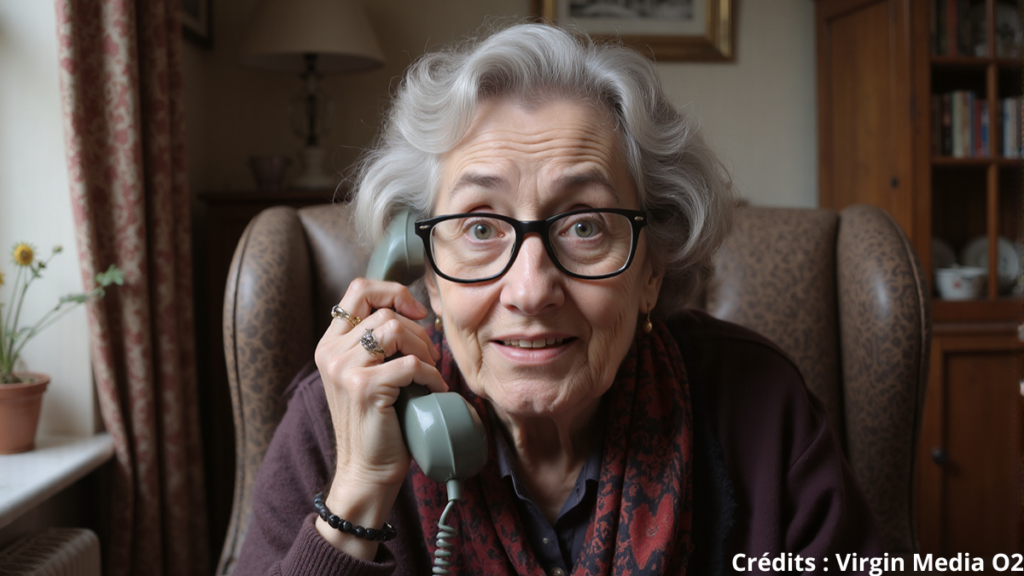The British telecom operator O2 has launched a groundbreaking initiative to combat phone scams using artificial intelligence. Meet Daisy, a retired AI “grandmother” programmed to outwit fraudsters by engaging them in endless conversations. Her mission? Waste their time and mental energy so they can’t scam real victims.
“Because while they’re busy talking to me, they can’t be scamming you”. Here’s how Daisy presents her role in the fight against phone jammers. On November 15, British operator O2 announced the launch of its new Artificial Intelligence, Daisy, a touching grandmother designed to answer calls from phone jammers.
AI Daisy takes on the traits (ageist stereotype?) of an isolated grandmother, who rambles, takes her time and simply seeks “company”. She even has her own telephone number.

“Let’s face it dear, I got all the time in the world”
According to O2, Daisy has already held conversations lasting over 40 minutes with the scammers. She takes her time, asks lots of questions, asks to repeat herself regularly, or deviates by talking about her cat or the latest knitting she’s done. But how can an AI deceive a human being to such an extent?
Daisy combines several AI models that work together to listen to the caller and transcribe their voice into text. Appropriate responses are then generated using a large language model”. This data is then fed back to a customized AI text-to-speech model to generate a voice response”, all “in real time.
Virgin Media O2
In the longer term, it will, according to O2, “shed light on the techniques used by these fraudsters, helping customers to better protect themselves”.
Finally, Virgin Media O2, invites British to report scam numbers by sending them to 7726. These numbers are then redirected to Daisy, adding an effective touch of revenge against fraudulent practices.
An AI that’s a little (a lot) too cliché
While Daisy’s efficiency and humor are very appealing, the video presentation raises an important criticism: it reinforces ageist stereotypes. By choosing a slightly “lost”, over-talkative fake grandmother as the embodiment of the tool, the O2 operator conveys a simplistic, caricatured image of the elderly. This cliché of the disconnected, isolated senior may be funny in this context, but it helps perpetuate preconceived ideas about our elders.
Seniors, the first victims of online scams

While Daisy presents itself as an innovative response, its humorous nature may mask a serious problem: the scale of telephone fraud, particularly among senior citizens.
In France, nearly 800,000 people over the age of 75 fall victim to telephone scams every year. In the US, it’s 1 in 10 elderly Americans that are abused each years.These people, often isolated or unaccustomed to new technologies, fall into the trap of fraudsters who exploit their trust and vulnerability.
Seniors are particularly exposed to several types of scam:
- Phishing: e-mails or SMS imitating official institutions to harvest sensitive information.
- Bank fraud: unauthorized debits or transfers.
- Romance scams: fake online profiles exploit the need for affection to ask for money.
- Telephone scams: promises of non-existent products or profits in exchange for immediate payment.
These practices, often coupled with a sense of shame among victims, lead to significant financial losses and psychological trauma.

Despite the fact that Daisy represents an ingenious and playful step forward in the fight against telephone scams, this initiative also highlights the importance of adopting a respectful and inclusive approach when designing such innovations, without giving in to ageist clichés. While seniors remain the first victims of these scams, it is essential to step up awareness campaigns, improve digital support and promote solutions adapted to all audiences, while breaking down stereotypes.
This “artistic” choice by telephone operator O2, or rather caricatured marketing choice, stems from the fact that the people scammed in this way are very often senior citizens. A good cliché for a good cause?
Published by the Editorial Staff on
